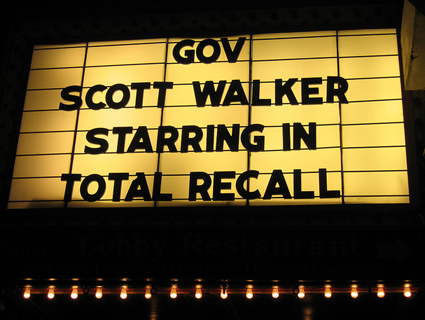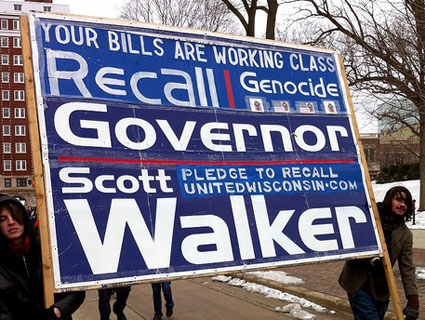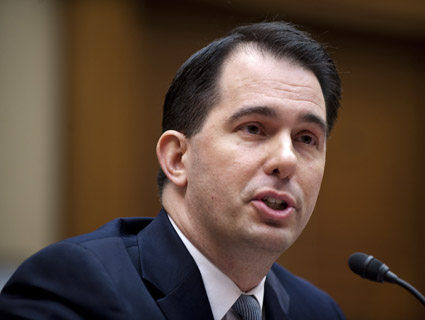
<a href="http://www.flickr.com/photos/_kristy_/5519069170/">_kristy_/Flickr
Wisconsin Gov. Scott Walker and his Republican allies in the legislature are using every tool in their kit to clamp down the unions, progressives, and otherwise pissed-off citizens aiming to recall the governor. They’ve tried to throw up more hurdles in the signature-gathering process in a recall, and angled to implement new, GOP-friendly districts to help state senators withstand new recall efforts.
Now, as the Milwaukee Journal Sentinel reports, the Walker administration wants to make protesters pay to protest inside the state Capitol, a move that one legal expert calls “put[ting] a price tag on the First Amendment”:
Gov. Scott Walker’s administration could hold demonstrators at the Capitol liable for the cost of extra police or cleanup and repairs after protests, under a new policy unveiled Thursday.
The rules, which several legal experts said raised serious free speech concerns, seemed likely to add to the controversy that has simmered all year over demonstrations in the state’s seat of government.
The policy, which also requires permits for events at the statehouse and other state buildings, took effect Thursday and will be phased in by Dec. 16. Walker administration officials contend the policy simply clarifies existing rules.
State law already says public officials may issue permits for the use of state facilities, and applicants “shall be liable to the state…for any expense arising out of any such use and for such sum as the managing authority may charge for such use.”
But Edward Fallone, an associate professor at Marquette University Law School, said the possibility of charging demonstrators for police costs might be problematic because some groups might not be able to afford to pay.
“I’m a little skeptical about charging people to express their First Amendment opinion,” he said. “You can’t really put a price tag on the First Amendment.”
You can understand why Walker might feel defensive. This week, United Wisconsin, the group spearheading the effort to recall Walker, announced it had gathered more than 300,000 signatures in 12 days. The group only needs 540,208, and it has 60 days to gather them. United Wisconsin, which has signed up 20,000 volunteers, says it wants to collect upwards of 700,000 or 800,000 signatures by the mid-January filing deadline.
For his part, Walker says he’s not worried about the recall. He told CNBC on Wednesday, “I look forward to [a recall election]. I’d love to have the chance to talk to the voters of Wisconsin again to tell that story.”

















